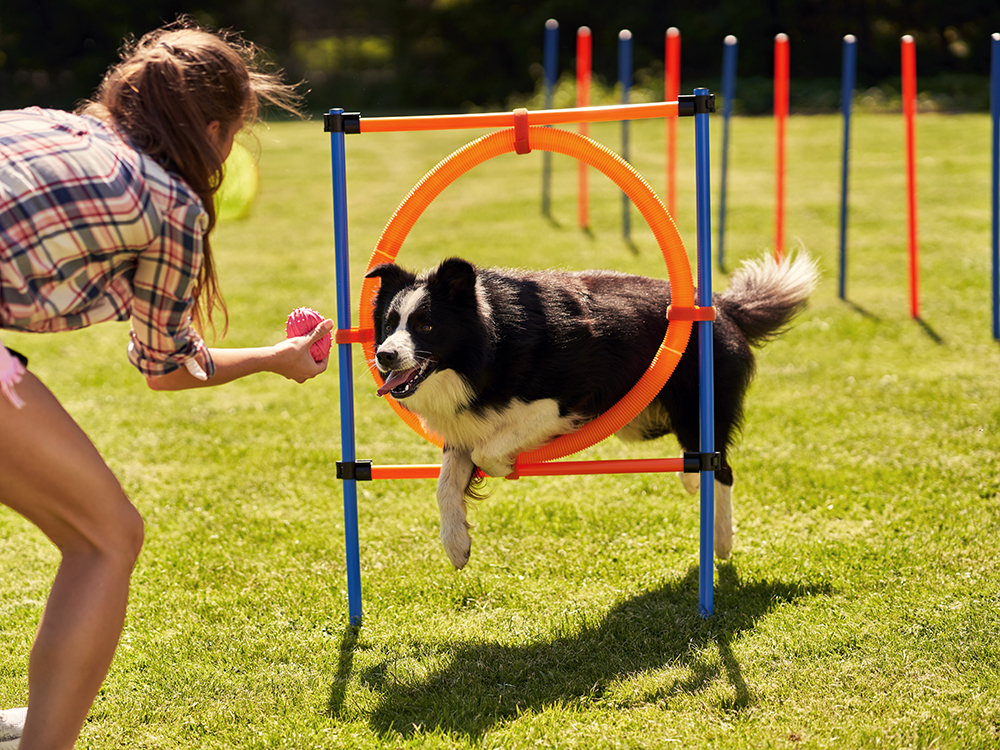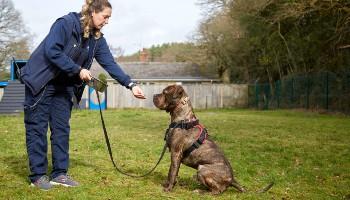How to Incorporate Dog Training into Your Daily Routine
How to Incorporate Dog Training into Your Daily Routine
Blog Article
The Ultimate Overview to Pet Dog Training: Transform Your Pet's Actions
Efficient pet training is vital for fostering an unified connection between pets and their proprietors. The ins and outs of canine behavior and the execution of organized training techniques play a crucial duty in this procedure. By comprehending the principles of favorable reinforcement, uniformity, and socialization, pet proprietors can navigate usual difficulties that arise throughout training. This guide not just aims to outfit you with the required devices to transform your pet's habits yet likewise welcomes you to check out just how these foundational principles can cause a much deeper connection with your pet dog. What may be the initial step in this transformative trip?
Comprehending Pet Behavior
Comprehending pet behavior is important for efficient training and an unified partnership in between pets and their proprietors. A pet's behavior is influenced by a combination of genetics, environment, and experiences. Dog training. Recognizing these variables permits proprietors to customize their training approaches to fulfill the specific demands of their pet dogs
Pets connect largely via body movement, articulations, and faces. As an example, a wagging tail can indicate exhilaration or joy, while a put tail might indicate concern or submission. Observing these cues enables owners to react suitably, strengthening positive behaviors and addressing adverse ones properly.
In addition, comprehending the social structure of pet dogs can provide understandings into their actions. Canines are pack pets, and they flourish in an organized environment. Developing clear boundaries and regular rules can prevent complication and promote a complacency.
Furthermore, identifying the natural impulses of dogs, such as need to dig or chase, is vital. These instincts can be redirected with appropriate outlets, such as play or workout. By adequately understanding these behavioral facets, proprietors can foster a positive training experience, inevitably leading to a obedient and well-adjusted canine buddy.
Essential Training Methods
Efficient pet training relies on a variety of vital strategies that can significantly enhance the discovering procedure for both the pet dog and the proprietor. One fundamental technique is positive reinforcement, which includes satisfying preferable actions with deals with, appreciation, or play. This method encourages dogs to repeat the actions that cause positive outcomes, cultivating a trusting relationship between the animal and owner.
Another key strategy is consistency in expectations and commands. Using the very same spoken hints and hand signals assists the canine comprehend what is needed, reducing complication and advertising quicker learning. Furthermore, establishing clear boundaries and rules is essential for effective communication.
Socializing is additionally a crucial element of training. Subjecting canines to different settings, individuals, and other animals aids them establish suitable social skills and lowers stress and anxiety in unknown situations.
Last but not least, perseverance and timing are important. Educating sessions must be short but constant, making sure that the pet stays engaged and responsive. By employing these essential strategies, owners can develop a structured and favorable training experience that promotes excellent actions and enhances the bond with their canine friends.
Developing an Educating Schedule
How can a well-structured training routine enhance a pet dog's learning experience? A training timetable supplies consistency, making sure that dogs obtain regular, focused guideline. This predictability helps pets understand what is anticipated of them, enhancing their knowing and enabling better retention of commands and actions.
When producing a training timetable, it is necessary to take into consideration the dog's age, breed, and specific temperament. Young young puppies might take advantage of shorter, much more constant sessions, while grown-up dogs may prosper with longer, much less constant training periods. Integrating a range of tasks can additionally keep the sessions engaging, avoiding monotony and advertising excitement for understanding.
Additionally, scheduling training sessions at particular times of the day can assist strengthen a regimen. Matching training with daily walks or playtime can develop a favorable organization with understanding. It is additionally crucial to include time helpful hints for reinforcement, such as deals with or praise, to compensate desired actions promptly.
Lastly, flexibility is key. While uniformity is essential, being versatile to the pet's state of mind or energy degree can enhance their learning experience. A well-crafted training timetable inevitably lays the structure for efficient communication and a stronger bond between the pet and proprietor.
Typical Training Challenges
Regardless of having a well-structured training timetable, pet dog owners frequently experience various obstacles throughout the training process. One usual concern is variance in commands and hints. When numerous household members use various terms or tones, a canine may come to be baffled, hindering its capacity to discover effectively.
An additional regular challenge is disturbance. Dog training. Canines are normally interested creatures, and exterior stimuli such as various other animals, sounds, or people can divert their focus during training sessions. This calls for owners to develop a controlled environment or slowly present diversions to reinforce emphasis
Additionally, varying power levels can influence training outcomes. High-energy pet dogs may have a hard time to settle down and focus, while more laid-back types might require additional motivation to involve. Tailoring the training technique to fit the specific canine's personality is important for success.

Building a Strong Bond
A strong bond between a pet dog and its proprietor is crucial for successful training and overall well-being. Dog training. This connection promotes depend on, which is vital for reliable interaction throughout the training procedure. When a pet really feels linked and secure to its owner, it is most likely to react favorably to commands and signs
To construct this bond, uniformity is vital. Developing a regimen that includes routine feeding, exercise, and training sessions helps create a feeling of security. Furthermore, positive reinforcement techniques, such as deals with, appreciation, and play, strengthen preferred habits while strengthening the emotional link.
Socializing is one more important aspect of bond-building. Revealing your pet to various atmospheres, people, and various other pets assists look what i found them really feel a lot more comfy and confident, improving the bond with their owner. Taking part in tasks together, such as strolling, playing bring, or taking part in obedience training, advertises team effort and mutual enjoyment.
Verdict

Comprehending pet behavior is necessary for effective training and a harmonious partnership in between canines and their proprietors.Reliable canine training depends on a selection of important strategies that can considerably improve the learning process for both the proprietor and the dog.In spite of having a click here for more info well-structured training timetable, pet owners typically run into numerous challenges during the training process.In final thought, reliable pet training counts on a comprehensive understanding of canine habits, the application of necessary strategies, and the facility of an organized training timetable. By emphasizing positive support and consistency, dog owners can significantly enhance their animals' habits, eventually guaranteeing a harmonious connection and promoting the wellness of both the canine and its environment.
Report this page